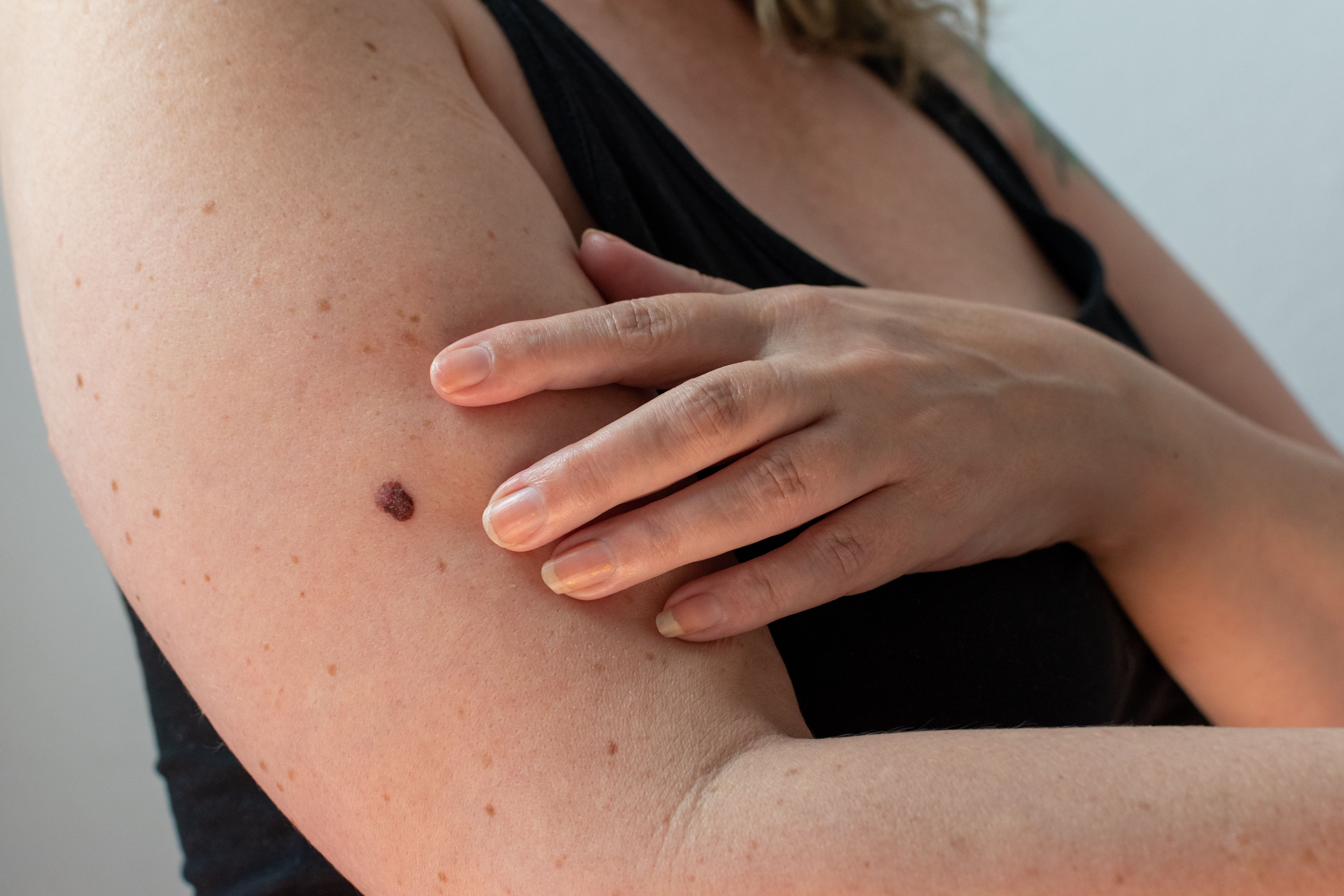News
Article
ASCO 2025: Promising Safety and Efficacy of Encorafenib and Binimetinib in Resected Stage II Melanoma
Author(s):
Key Takeaways
- Encorafenib and binimetinib showed a consistent safety profile in treating stage IIB/IIC BRAF-mutated melanoma, with promising efficacy results compared to placebo.
- The trial demonstrated improved 12-month recurrence-free survival and distant metastasis-free survival for enco+bini, suggesting potential as an alternative treatment option.
A new study reveals the combination therapy enhances safety and efficacy for high-risk BRAF-mutated stage II melanoma.
In the phase 3 EORTC-2139-MG/Columbus-AD clinical trial (NCT05270044), encorafenib in combination with binimetinib (enco+bini) demonstrated a consistent safety profile for adjuvant treatment of stage IIB or IIC cutaneous melanoma among individuals who harbored a BRAF mutation V600E or V600K, compared with placebo. These findings, which were presented at the 2025 American Society of Clinical Oncology (ASCO) in Chicago, Illinois, highlight promising results of the combination adjuvant treatment for high-risk stage melanoma.1
Image credit: MW Photography | stock.adobe.com

High-Risk Stage II Melanoma
Melanoma is a form of skin cancer that begins in the melanocytes, which are cells that develop pigmentation in the skin. While the cause of melanomas remains unclear, it is known that individuals exposed to ultraviolet light are more susceptible to the disease.2 Treatment options include melanoma surgery, or melanoma resection, which involves removing the melanoma and any surrounding tissue to prevent it from spreading. However, in advanced forms of the disease, such as stage II, resected melanoma has a high risk of recurrence.1 According to the National Cancer Institute, stage II melanoma is divided into stages IIA, IIB, and IIC. In stage IIB, the tumor is either more than 2 but not more than 4 millimeters thick with ulceration or more than 4 millimeters thick without ulceration, whereas in stage IIC, tumors are more than 4 millimeters thick with ulceration. Stages IIB and IIC were the focuses of the phase 3 trial.3
While surgery was long the only option for high-risk stage II melanoma, adjuvant therapies are now available, with anti-PD-1 significantly improving recurrence-free survival in individuals with fully resected stage IIB and IIC melanoma. Although combined BRAF and MEK inhibitor therapy has shown benefit in stage III and advanced disease, its effectiveness for fully BRAF-mutated stage IIB and IIC melanoma remains unknown, with enco+bini potentially offering an alternative treatment option by lowering the risk of chronic toxicities, according to study authors.1
Clinical Trial Methods
In the randomized, triple-blind, placebo-controlled, international, multicenter phase 3 superiority clinical trial, researchers aimed to evaluate the safety and efficacy of 12 months of enco+bini in the adjuvant setting of BRAF V600E/K mutant stage IIB and IIC melanoma compared to the current standard of care.4 Initially aiming for 815 individuals to demonstrate superior recurrence-free survival (RFS), the trial was prematurely terminated, leading to an amendment that prioritized safety as the primary end point and RFS as secondary.1
Following this, the investigators screened 339 individuals for a BRAF mutation between June 2022 and October 2023 before randomly assigning 110 individuals to receive either enco+bini or placebo arms. Among the 110 individuals, the median age was 59 years, 54% were male, 87 (79%) had BRAF V600E and 23 (21%) V600K mutations, 71 (65%) had AJCC8 stage IIB, and 39 (35%) had IIC. Individuals in both the enco+bini and placebo arms had a median follow-up of 12 and 7 months.1
Clinical Trial Results
The results demonstrated that among individuals receiving enco+bini, 24% of individuals (n = 13) experienced grade 3 or higher treatment-related adverse events (AEs), and 33% of individuals (n = 18) permanently discontinued treatment due to an AE. However, the investigators reported that only 1 individual had a serious treatment-related AE, and there were no deaths.1
Regarding efficacy, 4 individuals on enco+bini had an RFS event, compared to 9 individuals on placebo. Similarly, 3 individuals receiving treatment with enco+bini developed distant metastases compared to 5 individuals on placebo. Further results found that the 12-month RFS was 86% (95% CI: 65-95%) for those on enco+bini, compared with 70% (95% CI: 46-85%) for the placebo group. The distant metastasis-free survival at 12 months was 92% (95% CI: 77-97%) for the enco+bini group and 82% (95% CI: 55-93%) for the placebo arm.1
The findings suggest that the combination of enco+bini could offer further treatment options for individuals with stage IIB and IIC BRAF V600E/K cutaneous melanoma.1
REFERENCES
1. Akkooi A, Mandala M, Kicinski M, Primary analysis of the EORTC-2139-MG/Columbus-AD trial: A randomized trial of adjuvant encorafenib and binimetinib versus placebo in high-risk stage II melanoma with a BRAF-V600E/K mutation. J Clin Oncol. 43, 2025 (suppl 17; abstr LBA9500). doi:10.1200/JCO.2025.43.17_suppl.LBA9500.
2. Mayo Clinic. Melanoma. December 30, 2023. Accessed June 9, 2025. https://www.mayoclinic.org/diseases-conditions/melanoma/symptoms-causes/syc-20374884#:~:text=deeper%20skin%20layers.-,Melanoma%20is%20a%20kind%20of%20skin%20cancer%20that%20starts%20in,%2C%20back%2C%20face%20and%20legs.
3. National Cancer Institute. Stage II Melanoma. Accessed June 9, 2025. https://www.cancer.gov/publications/dictionaries/cancer-terms/def/stage-ii-melanoma
4. Adjuvant Encorafenib and Binimetinib in High-risk Stage II Melanoma With a BRAF Mutation. (COLUMBUS-AD). ClinicalTrials.gov identifier: NCT05270044. Updated November 11, 2023. Accessed June 9, 2025. https://clinicaltrials.gov/study/NCT05270044
Newsletter
Stay informed on drug updates, treatment guidelines, and pharmacy practice trends—subscribe to Pharmacy Times for weekly clinical insights.





